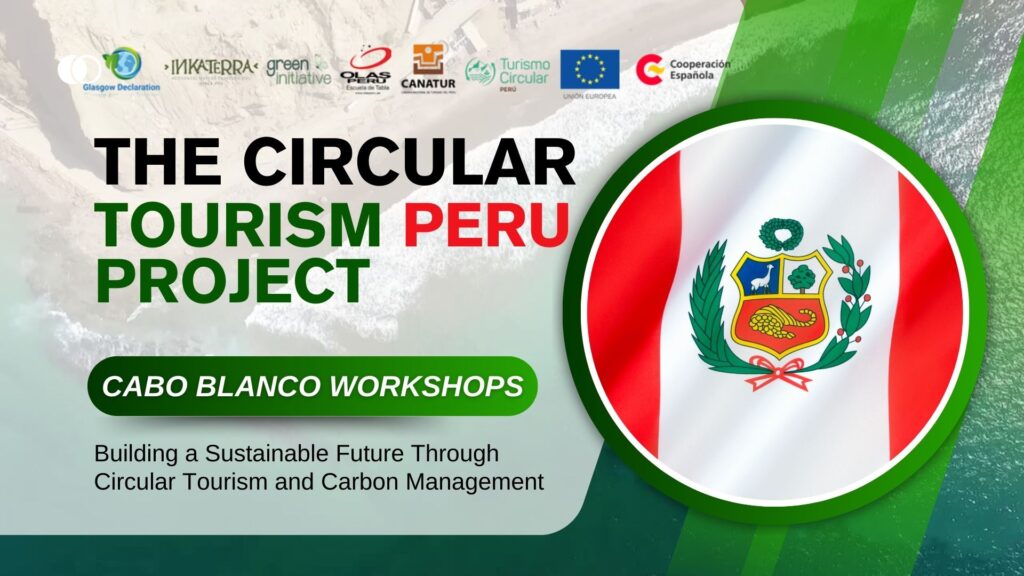Cabo Blanco Launches Workshops on Circular Tourism and Carbon Management: Skills, Jobs, and Growth for a Sustainable Future
The Cabo Blanco Carbon Neutral Certification Project—led by the Municipalidad Distrital El Alto, CANATUR, AECID (Cooperación Española), the European Union, and organized by Green Initiative, responsible for the technical assistance of the Circular Tourism Peru project, with funding from AECID and the European Union, and with the valuable support of partners including Inkaterra Hotels, ITA Inkaterra Asociación and Olas Perú—is setting a new benchmark for sustainable tourism in northern Peru. At the core of this initiative is the creation of specialized training workshops designed to strengthen the technical and operational capacities of local tourism actors, both public and private. These sessions will enable stakeholders to adopt circular economy practices and implement carbon management tools, ensuring that Cabo Blanco advances toward becoming a climate-neutral and internationally competitive destination. Building Local Skills for Global Competitiveness The workshops—organized under the Turismo Circular Perú project, led by CANATUR with the support of AECID (Spanish Cooperation), the European Union, and carried out by Green Initiative —will combine technical training with practical application. Participants will learn how to: As Carlos Loayza, General Manager of CANATUR, notes:“These workshops are not just about knowledge transfer—they are about giving our communities the tools to become leaders in sustainable tourism, generating opportunities for business and employment while caring for the environment.” Driving Socio-Economic Benefits Investing in sustainability has clear economic advantages. Studies of certified sustainable hotels have shown measurable benefits, including higher revenue per available room (RevPAR) and stronger competitiveness. At the same time, niche markets such as surf tourism are already delivering significant local impact: in nearby Lobitos, surf tourism injects an estimated US$3.6 million annually into the local economy through visitor spending. By equipping Cabo Blanco’s stakeholders with the right skills, the workshops are expected to: As Tatiana Otaviano, Head of Relationships of Green Initiative, explains:“Sustainability is no longer just an environmental responsibility—it is an engine for prosperity. By training local actors in circularity and carbon management, we ensure that Cabo Blanco’s communities benefit directly from tourism growth.” A Shared Commitment The Cabo Blanco Carbon Neutral Certification Project represents a collective effort: As Mayor Reedy Bancayán Palomino of El Alto affirms:“For Cabo Blanco, this project is about more than tourism—it is about shaping a sustainable future, creating opportunities for our youth, and positioning our community as a global example.” Agenda – Cabo Blanco Carbon Neutral Certification Project Launch Location: Cabo Blanco, El Alto District, Piura – Peru Date: October 1, 2025Time: 14:00 hrs 1. Welcome and Introduction – 20 min Cultural activity: traditional local performance 2. Workshop: Circular Tourism Peru Project – 45 minOrganized by CANATUR, with funding from AECID – European Union and technical support from Green Initiative. 3. Cabo Blanco / El Alto Destination Development – 30 min Closing: Signing of the Glasgow Declaration on Climate Action in Tourism Looking Ahead These workshops are not isolated events; they are catalysts of transformation. By investing in capacity-building, Cabo Blanco is laying the foundation for a climate-positive, circular, and inclusive tourism model that delivers measurable environmental benefits while driving socio-economic growth.From training to action, from local empowerment to global recognition—Cabo Blanco is proving that sustainable tourism can create jobs, strengthen communities, and protect the planet. This article was written by Musye Lucen from the Green Initiative Team. Related Reading



